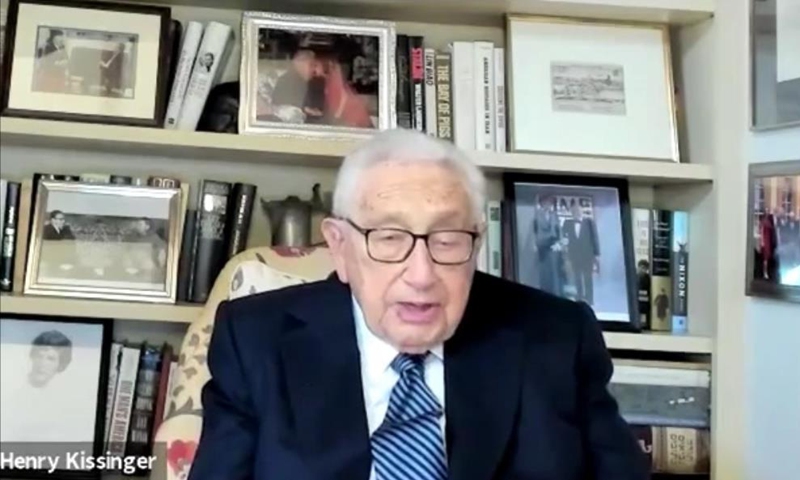
Photo: Henry Kissinger
Henry Kissinger, the veteran US diplomat, sent out a fresh warning to the Biden administration amid rising tensions in the Taiwan Straits, saying he sees today's world as verging on a dangerous disequilibrium and calling careful actions. Yet the White House continued shifting the blame to China over the consequences of the provocative trip of US House Speaker Nancy Pelosi to Taiwan island, ignoring the growing voices of far-sighted politicians and observers in the US who opposed the trip. Chinese experts believe that today's US government, which lacks political wisdom and strategic insight, is becoming a great uncertainty to the world.
In an interview with The Wall Street Journal, Kissinger, the 99-year-old former secretary of state, is worried about "disequilibrium." He said "we are at the edge of war with Russia and China on issues which we partly created, without any concept of how this is going to end or what it's supposed to lead to."
On the Taiwan question, Kissinger is worried that the US and China are maneuvering toward a crisis, and he counseled steadiness on Washington's part, the US media reported on Friday. The US policy on Taiwan island has "preserved peace between China and the US for 50 years," he said, noting that "one should be very careful, therefore, in measures that seem to change the basic structure."
The provocative trip of Pelosi to Taiwan has aroused growing voices of opposition in the US, as not only mainstream US media outlets such as The New York Times came up with editorials saying that "the US relationship with China does not need to be so tense," but also some opinion leaders like Thomas Friedman called this trip "utterly reckless."
"This is a 99-year-old person educating the 79-year-old," Lü Xiang, a research fellow at the Chinese Academy of Social Sciences, told the Global Times on Sunday. "Apparently, the current US government has no idea about what the equilibrium is, as first, you have to admit the legitimacy of your counterpart. If you challenge the legitimacy including the sovereignty of your counterpart, it's impossible to reach an equilibrium," he said.
In my thinking, equilibrium has two components, Kissinger was quoted as saying in the WSJ report. "A kind of balance of power, with an acceptance of the legitimacy of sometimes opposing values. Because if you believe that the final outcome of your effort has to be the imposition of your values, then I think equilibrium is not possible. So one level is a sort of absolute equilibrium," he said.
The other level, he said, is "equilibrium of conduct, meaning there are limitations to the exercise of your own capabilities and power in relation to what is needed for the overall equilibrium."
Instead of having a broader strategic view, the current US president is calculating and scheming against others, and the US government is becoming a great uncertainty to the world, Lü said.
Diao Daming, an associate professor at the Renmin University of China in Beijing, said Kissinger's message is crucially important, which shows that over the past 50 years, the US and China have been maintaining a certain consensus over the Taiwan question, and the US' commitment to China over the question laid out an important political foundation for bilateral relations.
"The past decades of experience offered us wisdom today," he said, noting that some US politicians lack wisdom and flexibility in handling bilateral relations.
Despite China's repeated warnings and growing voices of opposition from the international community to Pelosi's provocative and reckless trip, the Biden administration continued criticizing China by saying that it "overreacted" to the trip.
US Indo-Pacific coordinator Kurt Campbell said on Friday that "China has overreacted and its actions continued to be provocative, destabilizing and unprecedented," Reuters reported. He also said that the "intensified pressure campaign" against the island has not ended and "we expect it to continue to unfold in the coming weeks and months."
He also reiterated that the US would conduct standard air and maritime transits though the Taiwan Straits in coming weeks.
"The recent rhetoric from the US side is highly unwise and irrational, as the White House first adopted a 'laissez-faire' attitude toward Pelosi's trip, and then some politicians appeared to be happy about its outcome, which is highly irresponsible," Diao said, noting that the US should correct its mistakes and dispel the negative impact of the trip instead of continuing to fan the flames.
The Chinese People's Liberation Army (PLA)'s military exercises and training activities around the island of Taiwan is more like "putting our cards on the table," Lü said, noting that as long as those warships or aircraft pass through in innocent passage without any move of provocation or threatening China's jurisdiction over the waters, China will not have to take decisive measures in defending its sovereignty.
If the Biden administration continues fanning the flames, it is likely to lead to the "disequilibrium" Kissinger warned of and further affect China-US relations, Diao said.




